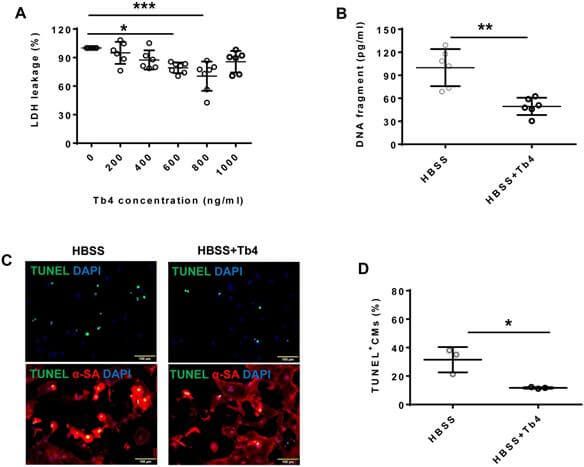Abstract: Thymosin beta 4(Tβ4) is a low molecular weight protein consisting of 43 amino acids residue and widely exists in various human tissues and cells. As one of the key actin regulators, Tβ4 plays an important biological role in physiology and pathology, such as tissue regeneration and remodeling, wound healing, maintenance of actin balance, tumour invasion and metastasis, apoptosis, inflammation, angiogenesis, hair follicle development etc.
Keywords: Thymosin Beta 4 Function, Apoptosis, Inflammation, Tissue Regeneration, Wound Healing
1. Thymosin Family Member
There are 16 thymosin family members. Tβ4, Tβ10 and Tβ15 are found in human beings. Tβ4 is the 5.0 kDa member of the beta-thymosin family. The sequence length of this family member is within 41-44 amino acids. Isoelectric point is between pH 4.0-7.0. Mature human thymosin beta 4 has the same sequence as mouse sequence, and also has 74% sequence similarity with Thymosin beta 10.
2. Thymosin Beta 4 Function
2.1. Promote Cell Migration and Adhesion
Tβ4 binds with G-actin through the extended structure. The binding is prevented by space resistance and salt-induced actin polymerization. Polymerization and depolymerization of actin subunit is the key mechanism for Tβ4 to promote cell migration. The research shows Tβ4 has obvious dose effect in increasing EPC's function (endothelial progenitor cell) during proliferation, colony formation, migration and adhesion.
2.2. Pro-angiogenesis Effect
Current research shows Tβ4 plays an important role in angiogenesis. In vitro and vivo test, Tβ4 can promote the proliferation and migration of endothelial cell, and also improve angiogenic ability. Furthermore, neovascularization can be promoted by inducing EPC’s differentiation and homing (endothelial progenitor cell). Low expression of Tβ4 has an great effect on angiogenesis.
2.3. Anti-apoptotic Role
Tβ4 can decrease alcoholic pro-apoptotic effect on human corneal epithelial cell in vitro via reducing damaged mitochondrial changes, releasing cytochrome c from mitochondria, increasing the expression of bcl-2 and the activity of aspartase.
2.4. Anti-inflammatory Role
In skin, cornea, heart injury and endotoxin induced septicemia sample, Tβ4 can downregulate inflammatory reaction intermediate and inflammatory response cell osmosis.
2.5. Tβ4-induced Hair Follicle Development
Tβ4 has the highest expression level and obvious regulation in the catagen and telogen phase of the first hair growth cycle. Tβ4 affects hair growth by acting on JNK and Notch signaling pathway.
3. Applications
- Skin treatment: corneal wound healing
- Heart disease: cardiomyocyte repair
- Central nervous system disease: synapse and axonal growth
- Respiratory disease/cystic fibrosis (CF): Inhaled pulmonary drug plays an important role in the pharmaceutical research on respiratory diseases. E.g. The aerosol solution (RGN-457) directly carries Tβ4 to the lung. RGN-457 can target to each lung region to decease adsorption of CF sputum.
4. Cited FineTest Product
| Product Name | Sample | Detection Target | Application |
| Recombinant Human Thymosin beta 4 (P5500) | serum / heart tissue | Thymosin beta 4 | ELISA |
Publication Details
Article Title: Thymosin β4 increases cardiac cell proliferation, cell engraftment, and the reparative potency of human induced-pluripotent stem cell-derived cardiomyocytes in a porcine model of acute myocardial infarction
Journal Title: Theranostics
DOI: 10.7150/thno.56757
IF: 11.6
PMID: 34335970
Validated Image

Figure Source: Theranostics. 2021; 11(16): 7879–7895.
Figure 1. Tb4 protects hiPSC-CM against hypoxic injury in vitro.
REFERENCES
Thymosin β4: a multi-functional regenerative peptide. Basic properties and clinical applications, PMID: 22074294.
